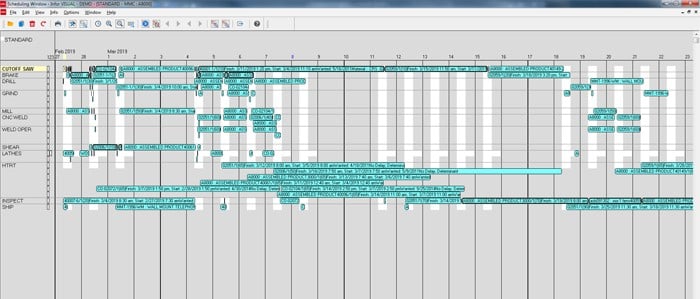I used VISUAL ERP scheduling
When I was a Plant Manager at a rotary die manufacturer in 1994, I bought an ERP system. The biggest problem I was trying to solve was scheduling the shop floor. We were in an industry that demanded 2-4 day lead times. Everything we did was custom; each work order had around 20 operations. It was rare for me to get a question about our ability to produce a die, because we had all the right type of fabricating equipment to produce a die. The real question was if we could produce it in the lead time the customer provided. In other words, did we have enough open capacity to do what the customer wanted us to do?
Before ERP, we handled this issue of promising a due date in the time honored manufacturing way: Sales would ask me, and I would provide an answer by guessing. It was an educated guess, but it was still a guess. Why did I guess? Well, what else could I do? I didn’t have any data. The homegrown system we used to run the company had no functionality to manage capacity. We didn’t have run times. There was no labor reporting. We had a really clean shop, we made great dies, but how we managed the business was pretty sloppy. This is what I inherited when I accepted the position; this is why I searched for and bought an ERP system. Within 4 weeks of going live, we were not only scheduling the shop floor, we were providing sales with actual lead times three times a day. Based on the number of orders we were receiving, our lead times would swing by as much as two days. Our ERP managed that, we managed the data, and our on-time delivery increased.
Related: Thinking of hiring a scheduler? That logic could be flawed.
If you are not scheduling with your ERP, you are experiencing all the problems I experienced before we used ERP to schedule. If you want to do what I did and use ERP scheduling, I can help you.
What is an ERP scheduling workshop?
Basically, I bring all of my real-life manufacturing, scheduling and ERP experience to you. The workshop is conducted at your production facility and I look at what you are doing and compare it to what I know you should be doing. The goals of the workshop are as follows:
- Raise your “scheduling IQ”. You’ll learn what scheduling is and what it isn’t. Learn what you should and shouldn’t do when it comes to scheduling.
- Discover what you are doing that prevents scheduling from working. Identify bad, misleading, or missing data and/or processes that are preventing scheduling from running properly.
- Assist in developing a plan to move forward. This is what companies need. They can articulate all the negative consequences of not scheduling well; but they don't know what to do to fix the problem.
Scheduling is not an individual effort, it is a team effort; therefore, the entire team should be at the workshop. Here are the areas of the company that should be represented:
- Executive leadership, e.g., Owner, President, etc.
- Engineering
- Production
- Material Management
- Purchasing
- Sales
- IT
As a final check for who should be at the workshop, ask yourself, “What areas of the company are responsible for on-time delivery, and what areas of the company are affected by late deliveries?” If the answer to that question includes leaders who weren’t on your list, add them.
Here's what the agenda of the day looks like:
- 8:30-8:45 – Introductions/Opening (entire group)
- 8:45-10:00 – Scheduling expectations presentation (entire group)
- 10:00-12:00 – Compare how you produce to how your ERP thinks you produce (Engineering/Production)
- 12:00-1:00 – Lunch (can work through it or we can break)
- 1:00-4:00 – TBD based on what I find
- 4:00-5:00 – Summary of what I find and suggestions (entire group)
In addition to the time I spend on-site, there is an additional 2-4 hours I spend off-site writing up my finding and your path forward.
Setting expectations
Just as I mentioned that scheduling is a team effort, I need to mention it is also a process. I guess it could be possible, but chances are really high that you will not be scheduling after the workshop. Look at the goals of the workshop again. It will raise your scheduling IQ, discover data issues, and provide you with a go-forward plan. Executing that plan takes time; you will be scheduling after you successfully execute the plan.
Let me set another expectation. This one is about executing the go-forward plan. Chances are you will need consulting help during this phase. The reason is pretty simple. If you knew how to fix the data issues I find, you would have fixed those issues already. Just to be really blunt, many of the data issues I point out come as surprises to the leaders participating in the workshop. In other words, no one was aware a problem even existed. In some cases, the problem is known, but they’re lost as to how to fix it.
Now is a good time to talk about shame and/or guilt. There is absolutely no shame in not understanding all the ins and outs of ERP. Our consultants are pretty smart and insightful when it comes to ERP and manufacturing in general, but they couldn’t produce what your company does. That’s what you are good at. Every company has to understand and embrace their limitations. Notice I said “embrace”, not “accept”. If you don’t have ERP expertise where you need it, we can fill that gap. Yes, it costs money. However, not managing your capacity costs more – a lot more.
If you'd like to have a free 30 minute discussion with me about scheduling, just click on the link below to get the ball rolling.






.jpg)


